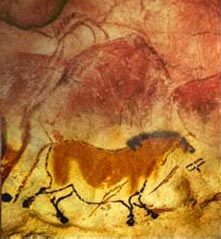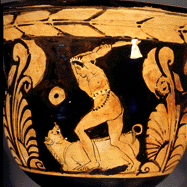Hunting, through the Ages
 The hunting is an activity, which according to the prevailing opinion of modern anthropology, was the main factor for the human development from mammal into a thinking human being. The adoption of more complex techniques, arms and tools for more productive hunting, differentiated human from other mammals of that era and helped to develop, through centuries, an evolved brain. Today it’s acceptable, that mankind would not have the same chance, if we had remained mainly vegetarians. For this our "brothers" herbivorous mammals are still remaining in, almost, the same biological condition.
The hunting is an activity, which according to the prevailing opinion of modern anthropology, was the main factor for the human development from mammal into a thinking human being. The adoption of more complex techniques, arms and tools for more productive hunting, differentiated human from other mammals of that era and helped to develop, through centuries, an evolved brain. Today it’s acceptable, that mankind would not have the same chance, if we had remained mainly vegetarians. For this our "brothers" herbivorous mammals are still remaining in, almost, the same biological condition.
Later on (about 25-30.000 years ago), realising the essential value of hunting, human began to attribute a divine entity to hunting, drawing hunting scenes of unrivalled art in caves, which used in religious and mystic ceremonies. Such hunting scenes are portrayed on stone drawings of the Palaeolithic Age, also in Hellas, in which appear the ways and tools that were used for hunting.

Hunting met its peak of "divine" significance in ancient Hellas. Innumerable fabulous heroes constituted for centuries the example for the education of youngsters, because of, mainly, the exceptional hunting skills of them. Those skills were also considered as martial faculties and "divine" bravery as well. Young people in ancient Hellas were trained in the dexterity of hunting, along with literature and the art of war. Because of the importance of hunting in ancient society, it was preserved by the Goddess Artemis, being a hunter herself. Of course not only for it’s nutritional value, because agriculture and livestock-farming had already been developed, but mainly for its educational value, while for the same reasons it was the subject of ancient author's masterwork like Xenofon, Aristotle and others. After the fall of the Hellenic democratic society and then the intensification of agriculture and livestock-farming, hunting lost its educational and "divine" status and became a sport (Roman Empire Era) and later it was the pastime only for the upper class of the society (Medieval Era - Renaissance), with particular, however, importance, as it appears mainly from the innumerable masterpieces of art that has been inspired by hunting themes. Afterwards the French Revolution, hunting is no more the privilege of the few upper class citizens and progressively will expand in all social classes. That expansion, however, came, unfortunately, in a period of time when the man was enjoying the power that gave him the continuously evolving technology, and he ignores completely the environment and the laws of nature, with an arrogance that becomes particularly perceptible in the first appearing industrial territories and in the colonies, where the "civilisation" was accompanied by uncontrollable and devastating interventions in the environment, with disastrous results for the fauna.
The enormous demographic explosion of mankind is certainly the main cause for the traditional biotope destruction. The continuously search for more vital space and more resources of food and energy is continued even today by mankind who extends continuously its vital space against the fauna and flora of our planet. Enormous wildernesses are being built (for several purposes), forests are vanishing daily in an effort of finding new land for us, not only in the third world countries but also in the heart of the industrial and developed countries. The "development" was and still is the "slogan" that led to the disappearance of countless biotopes with proportional reduction or even disappearance of many species.
Similar realignments and disappearances of millions of species, occurred of course also in the past before the appearance of humans, but that happened during many thousands of years and not in such a short, for our planet’s biological clock, period of time. The balance in nature never existed with the meaning that even today is supported by the various ecological organisations. The biosphere is continuously renewed and new species appears occupying the biological place of other species that didn’t accomplish to adapt to the changes.
Another example that projects in an elegant way the important role of hunting, not only in controlling the wild life populations and even the salvation of animals and human populations of territories, is the programmed hunting in the national parks of Africa. There, just a few years ago, those huge "protected" areas of national parks of those undeveloped countries, despite their perfect biotopes, couldn’t support not only the local villagers, but also the animals as well that were decimating by resident’s "poaching". Despite the desperate efforts of international organisations that sent there hundreds of representatives with money and foods, they couldn’t convince the residents to preserve the wild animals instead of killing them. The residents took the animals for food and money of the exploitation of bones, skins etc., but also as an "obstacle" in their extension in new lands. No one was willing to risk his life in a confrontation with poachers. When hunting programs began they saw the profit! A hunting program is worked out for each area, and estimates the number of animals and the species that will be hunt by hunters all over the world who are willing to pay out huge sums for hunting trophies. The income is enough not only for the growth of villages but also for the maintenance of trained game guards who will ensure a suitable number of animals for the next hunting period. Special accommodations have been organised into the parks that yield even more money from animals observers. Today, the governments of many African countries support such programs and henceforth the results are obvious to everyone. The populations of wild animals in those areas are stable and there will never be any danger for them as long as such programs are in use, but also the residents of those territories fully understood the need to preserve since their income depends on that. Almost all the big international ecological organisations admit today that without hunting very few could have been for the salvation of the animals.
Every year hunters are paying their fees in favour of the Hunting Fund, which totally amounts in the sum of 8.000.000 to 9.000.000 €. According to data of the Pan-Hellenic Union of Handicrafts and Hunting Goods Professionals, the annual turnover from the hunting activity amounts in the 945.000.000 € and the employees of the branch amounts in the 10.000.
Remarkable, however, is also the contribution of hunting in the growth of local economy of mountainous and frontier territories, strengthening the internal tourism, particularly at the wintry months. Lots of hotels, restaurants, gas stations, of those places owe their existence and keep on working, almost exclusively, because of the hunters.
However, according to international statistics, this sector, the hunting tourism, will benefit even more by the scientifically organised and managed rural and livestock land. The profits will be double. They will emanate from the increased hunting excursions to plenty of game places and from the parallel agricultural and livestock exploitation, by applying new and efficient techniques and cultivation. That will allow, on one hand, wild animals to remain and increase themselves, while, on the other hand, will produce at the same time more "pure" food for us. Such examples and techniques, indeed, exist in our "undeveloped" neighbouring countries! (Bulgaria k.a.).
It’s also an "intellectual exit" of people from cities and villages as well. It’s the magic of a hopeful sunrise and the melancholic colours of a sunset. It is the smell of nature that wraps around you and makes you feel that you belong there and you are NO enemy. It’s the deafening quietness of the forest and the mountain, disturbed only by your pant and that of your faithful friend, your dog. It’s the pleasure of your overwhelming efforts, in difficult weather and ground conditions, with your only reward perhaps, the undertaking of a little "interest" of the “game capital”.
Finally, it’s an essential activity for the salvation of the nature itself.



